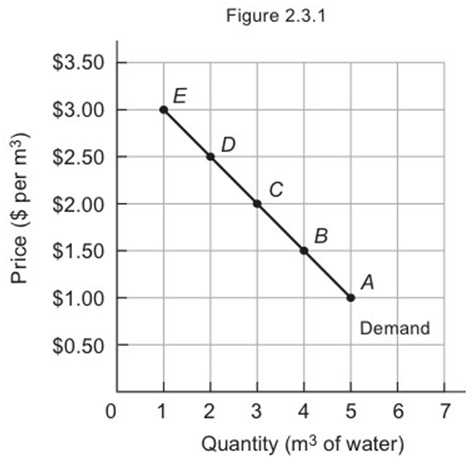Exam 2: Making Smart Choices: the Law of Demand
Exam 1: Whats in Economics for You Scarcity, Opportunity Cost, Trade, and Models215 Questions
Exam 2: Making Smart Choices: the Law of Demand159 Questions
Exam 3: Show Me the Money: the Law of Supply159 Questions
Exam 4: Coordinating Smart Choices: Demand and Supply226 Questions
Exam 5: Are Your Smart Choices Smart for All Macroeconomics and Microeconomics185 Questions
Exam 6: Up Around the Circular Flow: Gdp, Economic Growth, and Business Cycles277 Questions
Exam 7: Costs of Not Working and Living: Unemployment and Inflation255 Questions
Exam 8: Skating to Where the Puck Is Going: Aggregate Supply and Aggregate Demand304 Questions
Exam 9: Money Is for Lunatics: Demanders and Suppliers of Money227 Questions
Exam 10: Trading Dollars for Dollars Exchange Rates and Payments With the Rest of the World245 Questions
Exam 11: Steering Blindly Monetary Policy and the Bank of Canada217 Questions
Exam 12: Spending Others Money: Fiscal Policy, Deficits, and National Debt237 Questions
Exam 13: Are Sweatshops All Bad Globalization and Trade Policy205 Questions
Select questions type
Turnips are an inferior good. If nothing else changes, a rise in the price of turnips causes
(Multiple Choice)
4.9/5  (34)
(34)
Economists use the term demand to summarize the influences of factors other than price on the number of units that consumers want to buy.
(True/False)
4.8/5  (43)
(43)
If the price of hamburgers at McDonald's rises, the demand for french fries at McDonald's decreases because the products are substitutes.
(True/False)
4.9/5  (29)
(29)
Sam will drink anything that is cold, while Dave will only drink Gatorade. We expect Dave is willing to pay more for Gatorade than is Sam.
(True/False)
4.9/5  (38)
(38)
A person's marginal growth (in height) decreases as they age because
(Multiple Choice)
4.8/5  (25)
(25)
Your marginal benefits from a choice do not reflect how intensely you want it.
(True/False)
4.8/5  (39)
(39)
Your demand for a product or service depends only on your preferences, not on your income.
(True/False)
4.9/5  (37)
(37)
The high price of diamonds relative to the price of water is due to the fact that
(Multiple Choice)
4.8/5  (32)
(32)
 Figure 2.3.1.
-Look at the market for water in Figure 2.3.1. At point C,
Figure 2.3.1.
-Look at the market for water in Figure 2.3.1. At point C,
(Multiple Choice)
4.9/5  (36)
(36)
When income increases, the quantity demanded of inferior goods decreases.
(True/False)
4.7/5  (43)
(43)
Tourists are typically willing to pay more for products or services than local consumers because tourists get larger marginal benefits from these items.
(True/False)
4.8/5  (31)
(31)
The law of demand says that when price rises, quantity demanded decreases.
(True/False)
4.7/5  (45)
(45)
Quantity demanded is the sum of demands of all individuals willing and able to buy a particular product or service.
(True/False)
4.8/5  (47)
(47)
The demand curve shifts ________ if the price of a ________ product or service ________.
(Multiple Choice)
4.8/5  (38)
(38)
Economists use the term quantity demanded to summarize the influences of factors other than price on the number of units that consumers want to buy.
(True/False)
4.8/5  (37)
(37)
An online music store charges $1 per song. Your VISA bill shows that you spent $300 on songs last month. This means that your
(Multiple Choice)
4.8/5  (40)
(40)
If the price of hamburgers at McDonald's rises, the demand for hamburgers at Wendy's increases because the products are substitutes.
(True/False)
4.8/5  (40)
(40)
Sam will drink anything that is cold, while Dave will only drink Gatorade. We expect Sam is willing to pay more for Gatorade than is Dave.
(True/False)
4.9/5  (38)
(38)
Showing 61 - 80 of 159
Filters
- Essay(0)
- Multiple Choice(0)
- Short Answer(0)
- True False(0)
- Matching(0)